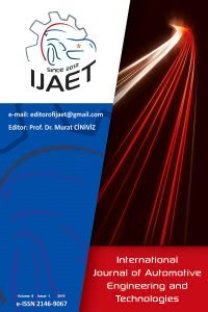The Effect of a homogeneous combustion catalyst on diesel consumption in south african engines
The Effect of a homogeneous combustion catalyst on diesel consumption in south african engines
___
- 1. http://www.huffingtonpost.ca/2011/0 8/23/car - population_n_934291.html, accessed 19 March 2014
- 2. Zhang, D., Homogeneous Combustion Cat alysts for Efficiency Improvements and Emission Reduction in Diesel Engines. 2009
- 3. Vanderschuren, M., Lane, T. & Wakeford, J., Can the South African transport system surmount reduced crude oil availability? Energy Policy, Volume 38(10), 6092- 6100. 2010.
- 4. May, W. & Edward, H. Catalyst for Improving the Combustion Efficiency of Petroleum Fuels in Diesel. 11th Diesel Engine Emissions Reduction Conference, August 21 - 25. 2005.
- 5. Celik, V. & Arcaklioglu, E. Performance maps of a diesel engine. Science Direct, Volume 81, 247- 259. 2005
- 6. Zhu, M., Ma, Y. & Zhang, D., An experimental study of the effect of a homogeneous combustion catalyst on fuel consumption and smoke emission in a diesel engine. Energy, Volume 36, 6004 - 6009. 2011.
- 7. Zhu, M., Ma, Y. & Zhang, D., Effects of a homogeneous combustion catalyst on the combustion characteristics and fuel efficiency in a diesel engine. Applied Energy, Volume 91, 166- 172. 2012.
- 8. E. Gallei, E. Schwab. Development of technical catalysis. Catalysis Today, 51, 535- 546, 1999
- 9. Twigg, M., P rogress and future challenges in controlling automotive exhaust gas emissions. Applied Catalysis B: Environmental, Volume 70, 2 - 15. 2007.
- 10. Sajeevan, A. C. & Sajith, V., Diesel Engine Emissions Reduction Using Catalytic Nanoparticle: An Experimental Investigation. Hindawi, Volume 2013. 2012.
- 11. He, C. et al., Emission characteristics of a heavy duty diesel engine at simulated high altitudes. Science of the Total Environment , 3138- 3143. 2011.
- 12. Hao, H., Wang, H. & Ouyang, M., Fuel composition and life cycle GHG emissions by China's on road trucks: Future trends through 2050 and evaluation of mitigation measures . Energy Policy, Volume 43, 244- 251. 2012.
- 13. Valentine J . M . & Peter- Hoblyn J . D. , Acres GK. Emissions reduction and improved fuel economy performance from a bimetallic platinum/ cerium diesel fuel additive at ultra- low dose rates. 2000
- 14. Keskin, A., Gürü, M. & Altıparmak, D. Influence of metallic based fuel additives on performance and exhaust emissions of diesel engines. Energy Convers Manager, 52, 60- 65. 2011 .
- Yayın Aralığı: 4
- Başlangıç: 2012
- Yayıncı: Murat CİNİVİZ
Evolutıon of traffic noise impacts in Amman, Jordan
Khair JADAAN, Hala GAMMOH, Abdelqader OKASHA, Ethar BREİZAT, Taqwa HADİDİ
M. Teresa PARRA-SANTOS, Ruben PEREZ, Ville VUORİNEN, Miguel-angel RODRİGUEZ, Francisco CASTRO
İlker ÖZKAN, Murat CİNİVİZ, Feyyaz CANDAN
Messam NAQVİ, Akhtar ABBAS, Hassan RAZA, Maria HAMİD
Molelekoa MOSESANE, Richard MBAYA, R: K. K. Mbaya, Lerato TSHABALALA, Lonji KALOMBO
The Effect of a homogeneous combustion catalyst on diesel consumption in south african engines
M.J MOSESANE, R.K.K MBAYA, L.C TSHABALALA, L. KALOMBO
Havacılıkta Doğadan Esinlenen Uçan Taşıtlar ve Gelecekteki Meydan Okumalar
Messam NAQVİ, Akhtar ABBAS, Hassan RAZA, Maria HAMİD
Flow features of confined swirling jets
Teresa PARRA, Ruben PEREZ, Ville VUORİNEN, Miguel - Angel RODRİGUEZ, Francisco CASTRO
